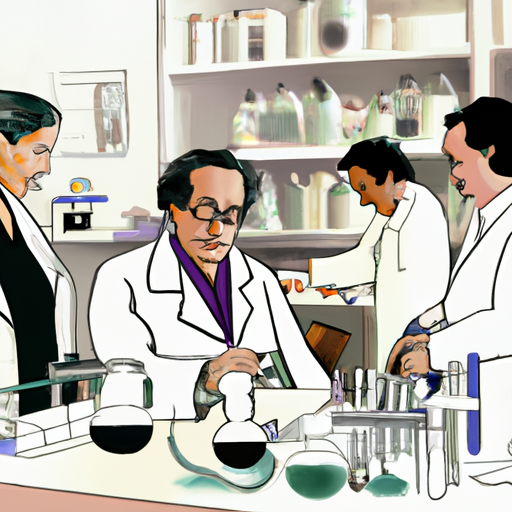למידע נוסף בנושא של therapeutic company נא לבדוק ב- truemedtx.com
This blog post explores the critical role that therapeutic companies play in modern medicine. It delves into their contributions towards research and development, production of effective treatments, partnering with healthcare providers, and how they facilitate patient access to medicines. The post also seeks to answer how these companies navigate the challenges of the 21st-century health landscape.
1. 'Therapeutic Companies: Pioneers in Research and Development?'
Therapeutic companies play a crucial role in driving innovation and advancements in modern medicine through their relentless commitment to research and development. These companies serve as pioneers in exploring new treatment modalities, conducting clinical trials, and bringing cutting-edge therapies to market. By investing heavily in scientific research, therapeutic companies are at the forefront of discovering breakthrough treatments for a wide range of medical conditions. Their dedication to pushing the boundaries of medical science has led to the development of life-saving medications that have transformed the landscape of healthcare.
Therapeutic companies employ teams of skilled researchers, scientists, and medical professionals who work tirelessly to uncover novel therapeutic approaches and potential cures for complex diseases. Through collaboration with academic institutions, healthcare providers, and government agencies, these companies leverage their expertise to accelerate the pace of medical innovation. By fostering a culture of continuous learning and exploration, therapeutic companies drive progress in the field of medicine, ultimately improving patient outcomes and quality of life. Their commitment to rigorous testing and adherence to regulatory standards ensures the safety and efficacy of new treatments before they reach patients.

1. An illustration showing a group of scientists in a lab, representing the research and development aspect of therapeutic companies.
2. 'Producing Life-Saving Treatments: The Primary Role of Therapeutic Companies'
Therapeutic companies are at the forefront of producing life-saving treatments that have a profound impact on patient outcomes and quality of life. Through their dedication to research, innovation, and manufacturing, these companies bring essential medications to market that address a wide array of medical conditions. From chronic diseases to rare disorders, therapeutic companies play a critical role in developing treatments that can significantly improve the health and well-being of patients around the globe.
Utilizing state-of-the-art technologies and expertise, therapeutic companies adhere to stringent quality standards to ensure the safety, efficacy, and consistency of their products. By conducting rigorous testing and adhering to regulatory guidelines, these companies uphold the highest standards of pharmaceutical manufacturing, guaranteeing that patients receive medications of the utmost quality and reliability. Their commitment to excellence in production processes and quality control measures underscores their dedication to delivering life-saving treatments that healthcare providers can trust.
3. 'The Power of Partnership: How do Therapeutic Companies and Healthcare Providers Collaborate?'
Therapeutic companies and healthcare providers engage in collaborative partnerships that are essential for advancing patient care and ensuring the successful delivery of life-saving treatments. By working together, these two entities leverage their respective expertise and resources to enhance the development, distribution, and utilization of pharmaceutical products. Healthcare providers offer valuable insights into patient needs, treatment efficacy, and real-world outcomes, guiding therapeutic companies in refining their products to better meet the demands of clinical practice. In return, therapeutic companies provide healthcare providers with access to cutting-edge therapies, enabling them to offer their patients the latest advancements in medical treatment.
Through collaborative efforts, therapeutic companies and healthcare providers foster open communication channels that facilitate the exchange of information, feedback, and best practices. This partnership-driven approach promotes a culture of continuous learning and improvement, driving innovation in the field of medicine and ultimately benefiting patients. Additionally, by aligning their goals and priorities, therapeutic companies and healthcare providers can streamline the drug development process, accelerate time-to-market for new treatments, and optimize patient outcomes. This collaborative model underscores the importance of teamwork and shared responsibility in the healthcare ecosystem, highlighting the transformative impact that can be achieved when industry and clinical experts join forces to improve patient care.

3. A graphic illustration of hands shaking, symbolizing the partnerships between therapeutic companies and healthcare providers.
4. 'Navigating Challenges: How are Therapeutic Companies Adapting to the 21st-Century Health Landscape?'
In the rapidly evolving 21st-century health landscape, therapeutic companies are facing a myriad of challenges that require innovative solutions and strategic adaptations. One of the primary challenges is the increasing complexity of regulatory requirements and market dynamics, which necessitate a nimble and proactive approach to drug development and commercialization. Therapeutic companies are investing in advanced technologies, data analytics, and artificial intelligence to enhance their research capabilities, optimize clinical trials, and expedite the drug discovery process. By leveraging these tools, companies can identify promising drug candidates more efficiently, reduce development timelines, and bring new therapies to market faster.
Furthermore, therapeutic companies are embracing a patient-centric approach to drug development, focusing on personalized medicine, targeted therapies, and precision healthcare solutions. By tailoring treatments to individual patient profiles and genetic markers, companies can improve treatment outcomes, minimize adverse effects, and enhance patient adherence and satisfaction. Additionally, therapeutic companies are expanding their global reach and diversifying their product portfolios to address a wide range of health conditions and patient needs. By establishing strategic partnerships, collaborations, and acquisitions, companies can access new markets, technologies, and expertise, enabling them to stay competitive in an increasingly interconnected and competitive healthcare landscape.
The role of therapeutic companies in modern medicine is more critical than ever. They stand at the forefront of innovative research and development, producing life-saving treatments for numerous diseases. In collaboration with healthcare providers and policy-makers, these companies ensure that patients receive the necessary care. Despite facing significant challenges, including high R&D costs and regulatory hurdles, therapeutic companies continue to shape the future of modern medicine, promising better health outcomes for all.
